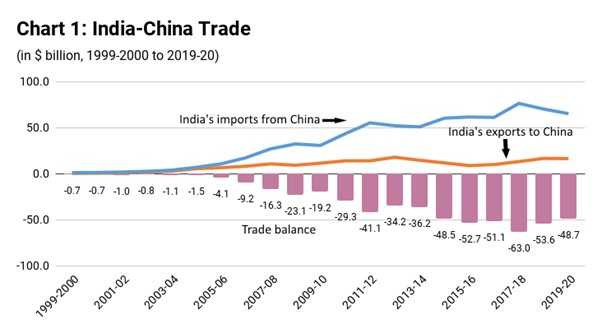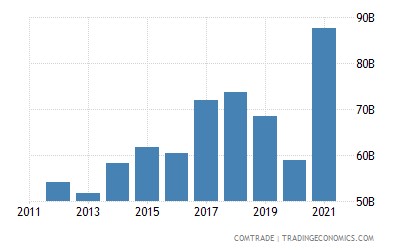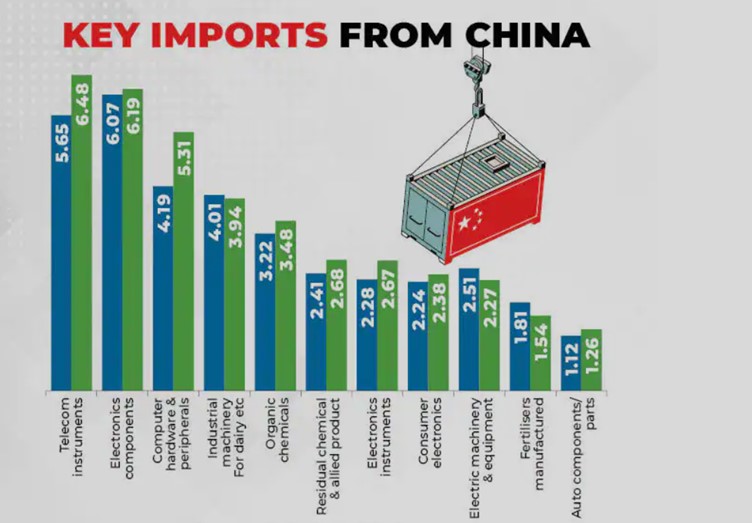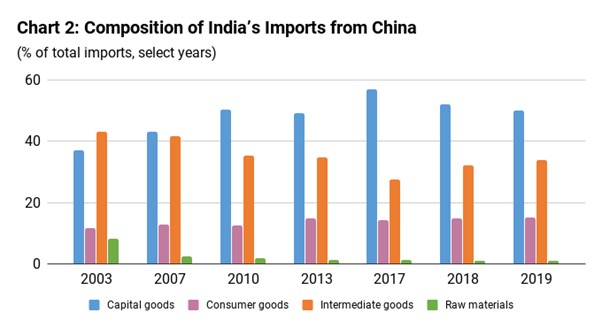Ever since the first Chinese soldier tried to cross the LAC in Galwan, India-China relations do not prescribe to any set notion of diplomatic principles. China has been hell-bent on decimating Indian interest, while India has not given much importance to it, except protecting its own interest of course. Despite that the narrative around India’s trade numbers with China does not seem to die down.
Stats do not lie but liars do use half-baked statistics to vindicate their narratives. It is perfectly applicable to the interest groups using the India-China trade deficit for their own gains. The less green side is deliberately shown in order to create sensationalism.
Piyush Goyal sets the record straight
Commerce Minister Piyush Goyal has put India-China trade numbers in correct political and economic perspectives. He was speaking about ballooning trade numbers between India and China. In the April-October time period of this fiscal, China exported $51.5 billion worth of product more than it imported from India. The number is being used as a political campaign by opposition leaders and other intellectuals belonging to the left end of the political spectrum.
Piyush Goyal has asked them to look at the bigger picture and use long-term trends, rather than short term ones to create Harakiri. Taking an indirect dig at the UPA government, he said that UPA’s bonhomie with China led to nearly 24 times increase in trade-deficit during their tenure. However, during the NDA government, it only doubled. In Parliament, Shri Goyal said, “The trade deficit with China in 2004-05 was $1.48 billion, which increased to $36.21 billion in 2013-14, an increase of 2,346%. Against this massive increase, the trade deficit with China has since increased by only 100% to $73.31 billion in 2021-22,”
Trade deficit with China is a legacy issue
Since the opposition has a tendency to distrust its own government and rely on foreign sources, these numbers are corroborated by World Bank data for corresponding years as well. During the UPA years, India’s manufacturing was at abysmal low level. This is a part of the legacy issue since for a major part of our post-1950 history, we have not cared to produce much for our own population. Instead, following the Soviet model, the reliance was placed on devolution of existing capital, rather than creating one.
Resultantly, our raw materials such as cotton, gems, precious metals, copper, and iron were exported to China and other countries. China made its manufacturing journey easier with these products and exported finished products to India, earning abnormal profits. Though things had changed a bit after 1991, policy paralysis of the UPA government ensured that China’s trade-surplus kept rising by astronomical numbers.
Yes, India’s imports have increased in last 2 years
Things changed after PM Modi’s push for Aatmanirbhar Bharat. India’s imports from China did increase during 2014-19, but the percentage change was not big. In fact, in 2016 and 2019, it had declined. The numbers slumped massively in 2020, but soon it took a sharp spike and in FY2022, India’s import from China was worth $89.7 billion.


These numbers are draconian. Right? Actually, no. The numbers have increased, but our consumers are not that dependent on China for their products.
We are importing to export
We are on the way to completely stop importing made in China products and using Chinese raw materials to manufacture finished goods on our own. Between 2011 and 2016, India’s consumer goods import from China was clocked at around $3-4 billion per year. India’s imports include consumer electronics, computer hardware, electrical parts, mechanical and electrical machinery, organic chemicals, power-related equipment, telecom, intermediate goods, plastics, and fertilisers among others. The total import value of these products have gone down to $2.84 billion in 2021.

These goods have been replaced by capital and industrial goods. Contrary to the annual fall of 1 per cent in consumer goods import from China, India’s Capital goods’ import from China has increased by 3 to 4 per cent on an annual basis. We are importing products like electronics, nuclear reactors, boilers, machinery, organic chemicals among others. 40 per cent of goods imported to use in our manufacturing industry now come from China.

A historic change
These goods are being used to push India’s manufacturing. Coincidentally, a boost to our manufacturing is being provided by companies leaving China as well. Of course, initiatives like aatmanirbhar Bharat, PLI scheme, make-in-India and plethora of other initiatives deserve credit for it. They are the ones pulling companies in India.
This is the reversal of trend and is historical to say the least. The British industrial revolution was built on our raw products and things did not change even after independence. Now, the trend has taken a historical shift and we should celebrate it, rather than cry foul about short term trends.
Support TFI:
Support us to strengthen the ‘Right’ ideology of cultural nationalism by purchasing the best quality garments from TFI-STORE.COM
























